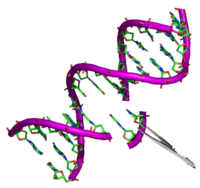
Photo from wikipedia
BACKGROUND Disease-modifying therapy in cancer can be defined as long-term treatment that has a beneficial outcome on the course of cancer, affecting the underlying pathophysiology. The anticancer potential of polyphenols… Click to show full abstract
BACKGROUND Disease-modifying therapy in cancer can be defined as long-term treatment that has a beneficial outcome on the course of cancer, affecting the underlying pathophysiology. The anticancer potential of polyphenols is widely studied. However, there is a significant gap between experimental data obtained in vitro and in vivo and the current polyphenol role in cancer therapy. OBJECTIVE In this article, the reason for this inconsistency is discussed, which might be in the design of polyphenols clinical trials. The approach of long-term polyphenol disease-modifying therapy in cancer is encouraged. CONCLUSION As the physiologic concentrations of polyphenols are not sufficient for reaching the cytotoxic levels, the immune-modulatory effects and effects on cancer intrinsic signal transduction pathways should be considered in polyphenol clinical trials design. Such effects apparently can not cause the rapid regression of the disease. However, more likely, they can modulate the course of the disease, leading to favorable changes in the patient's condition in case of long-term treatment that can be considered to be cancer disease modification.
Journal Title: Anti-cancer agents in medicinal chemistry
Year Published: 2022
Link to full text (if available)
Share on Social Media: Sign Up to like & get
recommendations!